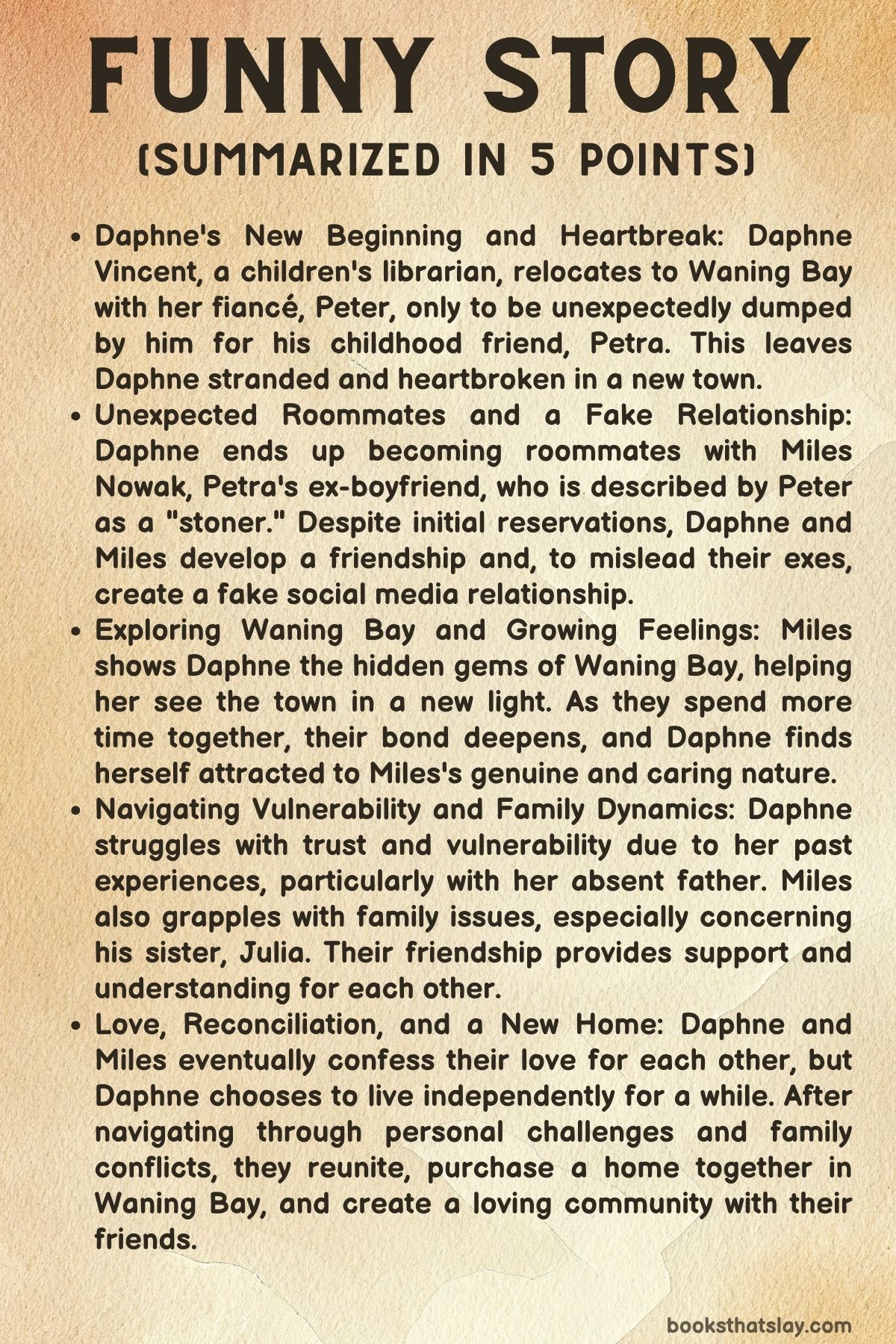Funny Story by Emily Henry Summary, Characters and Themes
“Funny Story” is a charming novel by Emily Henry following Daphne, who is unexpectedly dumped by her fiancé for his childhood friend.
Stranded in a small town, Daphne reluctantly moves in with her ex-fiancé’s ex, Miles. The unlikely roommates navigate their shared heartbreak, concocting a plan to deceive their exes with staged social media posts. Along the way, they form a surprising friendship and perhaps something more. Filled with humor and heart, the book explores themes of love, loss, and finding happiness in unexpected places.
Summary
Daphne Vincent’s life takes an unexpected turn when her fiancé, Peter, abruptly calls off their wedding, revealing his feelings for his childhood friend, Petra.
Heartbroken and stranded in Waning Bay, Michigan, Daphne finds herself without a home or a partner. In a twist of fate, she ends up moving in with Miles Nowak, Petra’s ex-boyfriend, who is described by Peter as a “stoner” with an unstable career.
Despite her initial reservations, Daphne discovers that Miles is kind and engaging, and she finds herself drawn to his quirky personality and rugged charm.
As they spend more time together, their connection deepens, and Daphne develops feelings for him. In a playful act of defiance, they decide to attend Peter and Petra’s wedding together, pretending to be a couple.
Their fake relationship soon begins to blur the lines between pretense and reality.
Daphne, initially unsure about her future in Waning Bay, starts to see the town in a new light through Miles’s eyes.
He introduces her to hidden gems and local favorites, allowing her to appreciate the town’s unique charm.
As her love for Waning Bay grows, so do her feelings for Miles.
However, Miles pulls back when their relationship becomes physical, claiming he doesn’t want to jeopardize their friendship.
Feeling isolated and longing for connection, Daphne finds solace in her friendship with her coworker, Ashleigh.
Ashleigh encourages her to pursue a relationship with Miles, but Daphne struggles to trust her own instincts after being betrayed by Peter.
The arrival of Miles’s sister, Julia, adds another layer of complexity to their living situation, as Miles’s past traumas and concerns for his sister resurface.
Despite the growing attraction between them, Daphne and Miles maintain a platonic relationship.
Daphne contemplates leaving Waning Bay and returning to her mother’s town, but she begins to realize that she can create a fulfilling life in Waning Bay, regardless of her romantic status.
Just as she’s considering her options, she receives a job interview for a library position in her mother’s town and faces a surprise visit from her estranged father, who unexpectedly shows up with his new wife.
Her father’s sudden departure and lack of emotional support leave Daphne heartbroken once again.
In the aftermath, Miles comforts her, and their relationship turns passionate. However, Miles disappears without explanation, leaving Daphne feeling abandoned and questioning his sincerity.
Determined to move on, Daphne focuses on her job interview and makes plans to leave Waning Bay.
In the midst of her emotional turmoil, she neglects her friendship with Ashleigh, causing a temporary rift.
Unexpectedly, Peter resurfaces, revealing that he and Petra have broken up and expressing his desire to reconcile with Daphne.
She firmly rejects him, but his words plant seeds of doubt about Miles’s loyalty. Daphne apologizes to Ashleigh, repairing their friendship, and temporarily moves in with her.
She confronts her father about the pain he caused her during her childhood, seeking closure and honesty.
The Read-a-thon event, which Daphne has been tirelessly organizing, proves to be a resounding success, with Miles and other community members coming together to support her.
After the event, Miles explains his disappearance, revealing that he sought out Daphne’s father to demand an apology on her behalf. He reassures her that he has no intention of reuniting with Petra.
Finally, Daphne and Miles confess their love for each other, but Daphne decides to live independently for a while.
Three months later, they purchase a home together and celebrate with their Waning Bay friends, symbolizing their newfound happiness and commitment.

Characters
Daphne Vincent
The protagonist, Daphne, is a woman in her thirties navigating a significant life change after being unexpectedly dumped by her fiancé. Initially portrayed as reserved and practical, Daphne’s character undergoes a transformation throughout the novel.
She grapples with feelings of insecurity, stemming from her childhood experiences with an absent father and a codependent relationship with her mother.
As the story progresses, Daphne learns to embrace her vulnerability, step outside her comfort zone, and ultimately discover self-love and happiness in unexpected ways.
Miles Nowak
Daphne’s love interest, Miles, is the antithesis of her initial expectations. He is a free-spirited, creative individual with a passion for music and a unique outlook on life.
Miles carries the weight of a difficult childhood, which has shaped his perspective and approach to relationships. Despite his own emotional baggage, he is kind, compassionate, and supportive of Daphne, encouraging her to explore her passions and discover her true self.
Peter Van Houten
Daphne’s ex-fiancé, Peter, serves as a catalyst for her personal growth. His betrayal forces Daphne to confront the reality of their relationship and re-evaluate her priorities.
While initially portrayed as charming and dependable, Peter’s actions reveal a lack of self-awareness and a tendency to prioritize his own desires over those of others.
Petra Landers
Peter’s new love interest and Daphne’s former friend, Petra, embodies the complexities of female friendships. Her actions demonstrate a lack of empathy and consideration for Daphne’s feelings.
However, Petra’s character also highlights the struggles individuals face when navigating their own desires and societal expectations.
Ashleigh Bellerose
Daphne’s co-worker and friend, Ashleigh, provides a much-needed source of support and encouragement.
Her outgoing personality and unwavering belief in Daphne’s potential help her navigate the challenges of heartbreak and self-discovery.
Ashleigh serves as a reminder of the importance of genuine friendships and the power of female solidarity.
Julia Nowak
Miles’s younger sister, Julia, adds another layer of complexity to the narrative. Her presence sheds light on Miles’s past traumas and his protective nature.
Julia’s character serves as a reminder of the lasting impact of childhood experiences and the importance of familial bonds.
Themes
Building Trust After Betrayal and Vulnerability
“Funny Story” delves into the challenges of rebuilding trust and embracing vulnerability after experiencing significant betrayals.
Daphne’s world is shattered when her fiancé, Peter, abruptly ends their relationship, leaving her questioning her own judgment and ability to trust others. She cautiously opens up to Miles, her new roommate, who has also experienced heartbreak.
Through their shared experiences and mutual support, they gradually rebuild their trust in themselves and each other. Daphne’s initial hesitations and fear of getting hurt are relatable, reflecting the common struggles many face after experiencing betrayal.
The novel emphasizes the importance of taking risks and allowing oneself to be vulnerable, even when it feels daunting.
The characters’ journey highlights the transformative power of trust and vulnerability in fostering deeper connections and healing emotional wounds.
Finding Home and Belonging in Unexpected Places
“Funny Story” explores the idea of finding home and a sense of belonging in unexpected places.
Daphne initially views Waning Bay as a temporary stop on her life’s journey. However, as she explores the town through Miles’s eyes and forms connections with the community, her perspective shifts.
She discovers hidden gems and develops a newfound appreciation for the town’s charm. Through her experiences at the library and her interactions with the locals, Daphne realizes that a sense of belonging can be found beyond familiar surroundings and pre-conceived notions.
The novel underscores the importance of being open to new experiences and embracing the unexpected. It suggests that home is not solely defined by a physical location but also by the relationships and connections we cultivate.
The Power of Found Family and Friendship
“Funny Story” celebrates the profound impact of found family and friendships in navigating life’s challenges.
Daphne, feeling isolated after her breakup, finds solace and support in her unexpected connection with Miles and his sister, Julia. Their shared living space becomes a haven where they create their own makeshift family.
Similarly, Daphne’s friendship with her colleague Ashleigh offers her a source of comfort and encouragement.
The novel illustrates how chosen relationships can provide a sense of belonging and support that rivals or even surpasses biological ties.
These bonds offer a safe space for vulnerability, laughter, and shared experiences, ultimately contributing to personal growth and healing.
Redefining Happiness and Embracing New Beginnings
The novel emphasizes the importance of redefining happiness and embracing new beginnings after experiencing setbacks.
Daphne initially clings to her preconceived notions of what her life should look like, leading to feelings of disappointment and resentment. However, as she opens herself up to new possibilities and challenges her assumptions, she discovers alternative paths to happiness.
She learns to let go of the past and embrace the present, finding joy in unexpected connections and experiences. The story encourages readers to embrace change and view setbacks as opportunities for growth and transformation.
It highlights the resilience of the human spirit and the ability to find happiness in unexpected places, even after experiencing heartbreak or disappointment.


